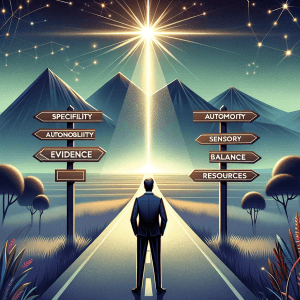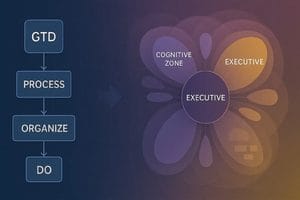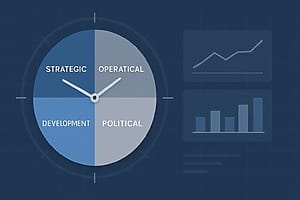Business leaders today are discovering what sports stars have known for years—that having a coach makes you better at what you do.
Executive coaching used to be something only a few companies offered their top leaders. Now, you can find it everywhere, from small businesses to major corporations.
Many companies see coaching as a smart way to help leaders grow and succeed. It has become a regular part of helping executives develop skills and tackle bigger challenges in modern workplaces.
Let’s look at some trends shaping executive coaching and what they mean for you as a leader.
TL;DR – Trends in Executive Coaching
Here’s a quick overview of the most important executive coaching trends:
- Digital-first coaching delivery
- AI-enhanced coaching experiences
- Democratization of coaching access
- Data-driven coaching outcomes
- Focus on wellbeing and resilience
- Emphasis on DEI initiatives
- Integration of team coaching
- Need for specialized niche expertise
For leaders seeking personalized guidance through these evolving practices, Tandem Coaching offers one-on-one executive coaching that adapts to your unique challenges and goals.
Schedule a free consultation with us to start on your growth path today!

Why Executive Coaching Works in Today’s World
Executive coaching works because it delivers measurable results. Organizations see up to a 788% return on investment from executive coaching programs.
These statistics provide a clear picture:
- 70% increase in individual performance
- 50% improvement in team performance
- 48% enhancement in organizational performance
- Up to 77% of executives report improvements in relationships with stakeholders
The numbers reflect why the executive coaching market continues to grow.
Additionally, according to the 2023 ICF Global Coaching Study, the coaching industry has grown by 54% between 2019 and 2022, with over 109,200 professional coaches worldwide generating annual revenue of $4.56 billion.
The success of executive coaching can be attributed to several factors:
- Personalized Development: Coaches provide tailored guidance based on individual needs and goals.
- Real-time Application: Learning occurs in the context of actual workplace challenges.
- Adaptable Format: Coaching can adjust to changing business environments and leadership needs.

Key Drivers of Executive Coaching Trends
Several fundamental shifts are driving the change in executive coaching:
- Growing Demand: Growing recognition of the benefits of executive coaching in business, including enhanced managerial skills, retention, and promotion readiness.
- Hiring Issues: Increased hiring challenges make development vital for retention and advancement.
- Receptive Younger Leaders: Younger leaders are more receptive to coaching, having grown up comfortable asking for help in an ambiguous world.
- Workplace Disruption: Workplace disruption since 2020 has accelerated adoption as virtual coaching has provided support amid chaos.
- Broadened Scope and Recognition: Coaching’s scope has expanded from fixing performance problems to strategic development, as research shows significant returns on investment. Even highly successful leaders now actively seek coaching to enhance their effectiveness and navigate new challenges.

8 Growing Trends in Executive Coaching
Here’s a detailed look at how executive coaching is evolving to meet modern challenges:
1. Digital-First Coaching Delivery
The days of strictly in-person coaching are behind us.
According to the Henley Business School report, 98.3% of coaches adopted online coaching during 2019-2021. About 43% of coaches now plan to do most (80% or more) of their coaching online.
Here are the popular platforms coaches use:
- Zoom leads the pack (83.3% of coaches prefer it)
- About 10% use extra tools like Menti, Miro, or Mural to make sessions more interactive
The executives report these benefits when they get online coaching:
- Convenience (no travel needed)
- A more comfortable, safer personal space
- Lower costs for them and their organization
- Better use of everyone’s time
However, some people still prefer face-to-face meetings (about half the coaches noted this) because:
- They find it easier to get distracted online
- Building relationships might take a little more effort
Despite these challenges, the future looks decidedly digital – 85% of coaches and 83% of clients prefer online coaching.
As coaches get better at using executive coaching tools online, your virtual coaching experience will only get better.

2. AI-Enhanced Coaching Experiences
Artificial Intelligence isn’t replacing coaches – it’s helping them serve you better.
The CoachHub Global Survey 2023 shows that organizations see several potential future applications for AI in coaching.
When asked how AI could be used:
- 48% of respondents suggested it could be used for data and reporting
- 35% saw the potential for AI-powered learning recommendations
- 32% thought it could assist with goal-setting
Plus, smart tools now help match you with the right coach for your needs.
3. Democratization of Coaching Access
Executive coaching is for more than just the C-suite.
The CoachHub survey (mentioned earlier) reveals a significant shift:
- 38% of organizations now offer coaching to mid-level managers
- 32% extend it to frontline leaders
- 27% offer to individual contributors at any level
- 22% to high potential employees or future successors
- 11% of the coaching budget goes to under-represented group
The executive leadership team represents only 34% of people who engaged in coaching.
This means you can access coaching support earlier in your career – whether through a career transition coaching or development program – when you’re building crucial professional skills for the future.

4. Data-Driven Coaching Outcomes
“What gets measured gets managed” isn’t just a catchy phrase – it’s becoming the backbone of modern executive coaching.
Nowadays, executive coaching programs track specific measures that matter to you and your organization (referring back to the CoachHub survey):
- 32% measure if you’re hitting your goals
- 26% look at how well you click with your coach
- 21% track positive changes in your leadership behavior
- 12% see if the coachee stays at the company longer
This data helps prove that coaching is worth your time and your company’s investment.
5. Focus on Wellbeing and Resilience
Being a leader today is more stressful than ever.
A recent Deloitte survey spanning four countries (the U.S., the U.K., Canada, and Australia) found that nearly 70% of C-suite executives face burnout and consider quitting their jobs to find roles that better support their wellbeing.
That’s right – even top leaders are prioritizing their mental health over traditional career paths. This shift explains why modern coaching isn’t just about business strategy anymore.
Your coach becomes a partner in building what we like to call your “leadership stamina.”
This means working on:
- Personal wellbeing strategies that fit your actual schedule (not just theoretical advice)
- Practical stress management techniques you can use in real situations
- Tools for maintaining work-life boundaries when everything feels urgent

6. Emphasis on DEI Initiatives
The 2023 study by the Human Capital Institute (HCI) shows that coaching plays a significant role in diversity, equity, and inclusion efforts:
- 54% of organizations include DEI in their coaching initiatives
- 80% of respondents agree that coaching helps employees better understand and implement DEI initiatives
- DEI coaching reaches broadly across the organization:
- 55% of senior-level employees receive DEI coaching
- 50% of high-potential employees receive DEI coaching
The study notes that as societal awareness around DEI continues to rise, coaching has become instrumental in:
- Equipping leaders with skills to manage diverse workforces effectively
- Helping individuals understand multicultural workspaces
- Fostering open dialogue and stronger relationships
7. Rise of Team-Based Coaching
A Fortune 50 CHRO quoted in SHRM’s study notes: “A lot of the C-suite have coaches. They’re all happy with their coaches, but it’s not helping us function better as a team or as a company.”
Team coaching directly addresses this common challenge.
While one-on-one coaching remains valuable, executive team coaching is becoming a game-changer.
The International Coaching Federation reports that 65% of staff in companies where coaching is valued are highly engaged.
Also, 80% of organizations worldwide seek meaningful ways to improve leaders and achieve organizational goals through team coaching initiatives.
What makes team coaching so effective?
- Your entire leadership team learns together, creating a shared understanding.
- The team dynamics get addressed in real-time.
- Everyone gets on the same page.
- Costs get optimized while impact multiplies.
8. Specialized Niche Expertise
The days of the “jack-of-all-trades” coach are fading. Today’s executives require coaches who deeply understand your specific situation.
That’s why more and more coaches are focusing on specialized areas rather than trying to serve everyone.
The coaching market shows a clear shift toward specialization in areas like:
- Digital transformation coaching
- Cross-cultural leadership coaching
- Innovation and startup coaching
- Crisis management coaching
- Merger and acquisition transition coaching
For example, if you’re leading a digital transformation, you need a coach who has guided others through similar changes.
This trend toward specialized expertise helps ensure you get guidance relevant to your unique challenges.

Challenges in Adapting to Coaching Trends
However, adjusting to these trends presents genuine challenges:
- Time Management Challenge: Continuous self-improvement is vital yet difficult alongside client commitments as best practices constantly change.
- Technology Integration Balance: Balancing human needs with technology risks losing crucial intimacy, empathy, and trust.
- Market Specialization Dilemma: Expanding niches makes finding the right coach-client fit tougher. Narrow specialties also limit coaches’ market.
- Perception Management: Fighting perceptions that coaching is unnecessary, only for poor performers, or whether hiring an executive coach is worth it remains an uphill battle.
- ROI Documentation Complexity: Proving ROI to obtain budgets still involves complex assessment, data ownership, and confidentiality issues.

How Tandem Coaching Supports Modern Leaders
At Tandem Coaching, we understand your challenges – whether you’re stepping into a new executive role, aiming for that next promotion, or leading through high-stress decisions.
Our ASPIRE process combines personalized executive coaching with evidence-based development across key areas:
- Strategic Vision Development: We help you gain crystal-clear clarity on your goals and create actionable plans to achieve them, even when the path forward seems uncertain.
- Leadership Skills Enhancement: Through one-on-one expert coaching, you’ll develop crucial capabilities like:
- Executive presence (how to command respect while staying approachable)
- Emotional intelligence (reading situations and people accurately)
- Strategic thinking (making complex decisions with confidence)
- Communication mastery (influencing others effectively)
- Performance Acceleration: Our structured yet flexible approach includes:
- Regular bi-weekly sessions to keep you accountable
- Progress checkpoints every four months
- Real-world application of new skills
Ready to maximize your impact? Let’s start with a free consultation to discuss your goals and challenges!

Frequently Asked Questions (FAQs)
Let’s clarify how some underlying drivers are impacting leaders and coaches.
How Is Technology Transforming Executive Coaching?
Virtual meetings, AI assessments, and even virtual reality now supplement traditional coaching, allowing increased scale and personalization.
As with any change management process, you must balance innovation with proven methods. Overusing tech risks losing the human connections vital for behavior change.
Blended approaches help balance high-touch and high-tech.
How Can Emerging Executive Coaching Trends Improve My Leadership Skills?
Modern coaching trends benefit leaders by:
- Providing flexible learning options
- Offering data-driven feedback
- Focusing on contextual challenges
- Supporting mental resilience
What Should Executives Seek in a Modern Coaching Program?
Look for niche industry expertise in your vertical, use of assessments and analytics, virtual access, and proven methods that go beyond basic models. Credibility indicators like ICF credentials and C-suite experience also predict impact.
For example, Tandem Coaching’s executive coaching solutions offer bespoke guidance from coaches with ICF credentials and real-world experience. This field-tested expertise makes all the difference in driving results.
What Qualities Define a Trend-Savvy Coach?
A trend-savvy coach demonstrates several key qualities:
- They stay current with digital coaching tools and platforms to support you effectively in a virtual environment
- They consistently upgrade their skills through advanced certifications
- They understand how to measure and track coaching impact using modern analytics
- They bring specialized expertise in your industry’s unique challenges rather than generic advice
- They know how to balance high-tech tools with high-touch personal connection
Most importantly, they practice what they preach – continuously learning and adapting their methods to match the changing needs of modern executives like you.
Conclusion
As executive coaching evolves with technology and workplace changes, staying current with these trends helps you maximize your growth potential.
But understanding trends is just the start—working with the right coach is crucial.
At Tandem Coaching, we offer personalized executive coaching through a proven ASPIRE engagement model. Our expert coaches work with you to unlock your full potential, enhance your communication skills, and achieve measurable results.
Schedule a free consultation with Tandem Coaching today to get the guidance and accountability you need!
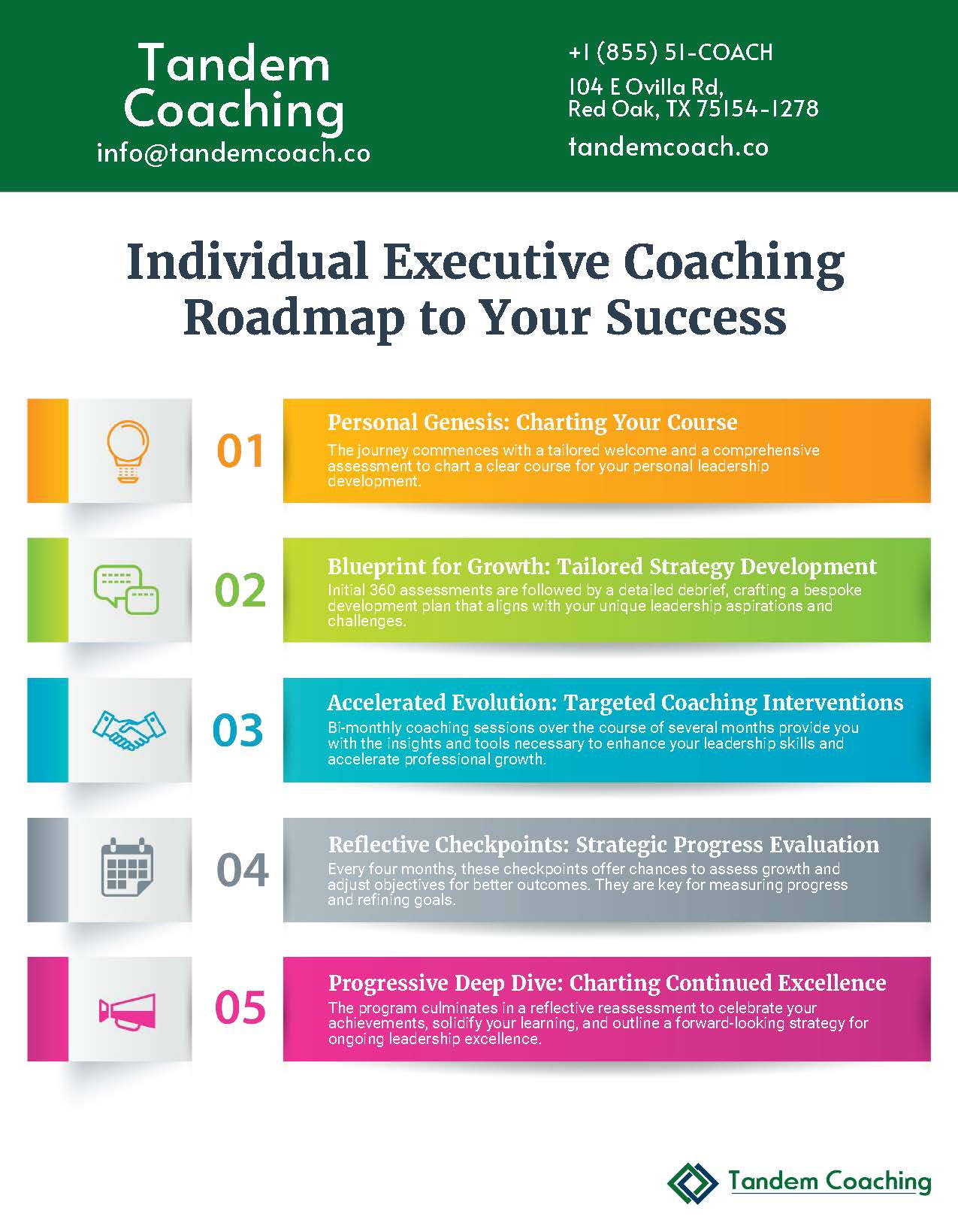

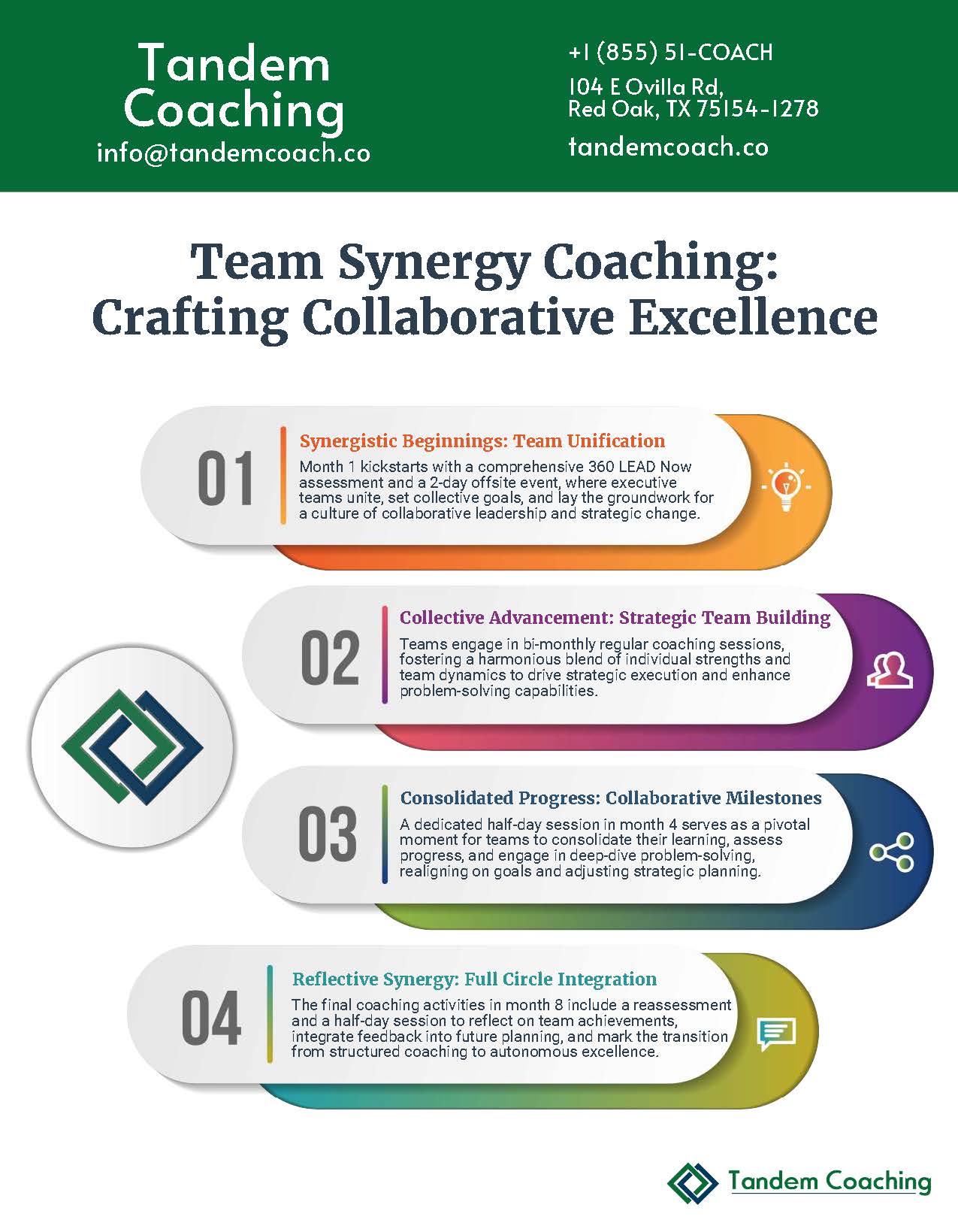
Boost Your Leadership Team Success!
Take your leadership team to the next level and achieve great results with our executive coaching.
Learn how our coaching and ASPIRE method can change things for you—get a free brochure to begin your journey.
About the Author
Cherie Silas, MCC
She has over 20 years of experience as a corporate leader and uses that background to partner with business executives and their leadership teams to identify and solve their most challenging people, process, and business problems in measurable ways.

